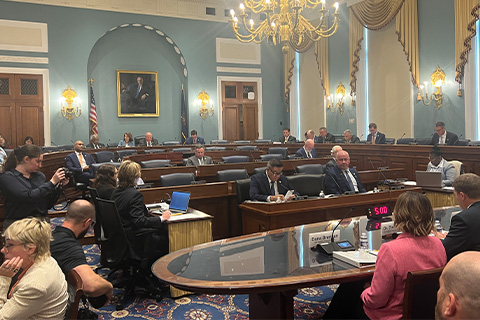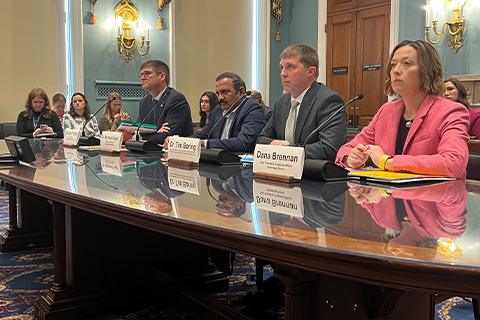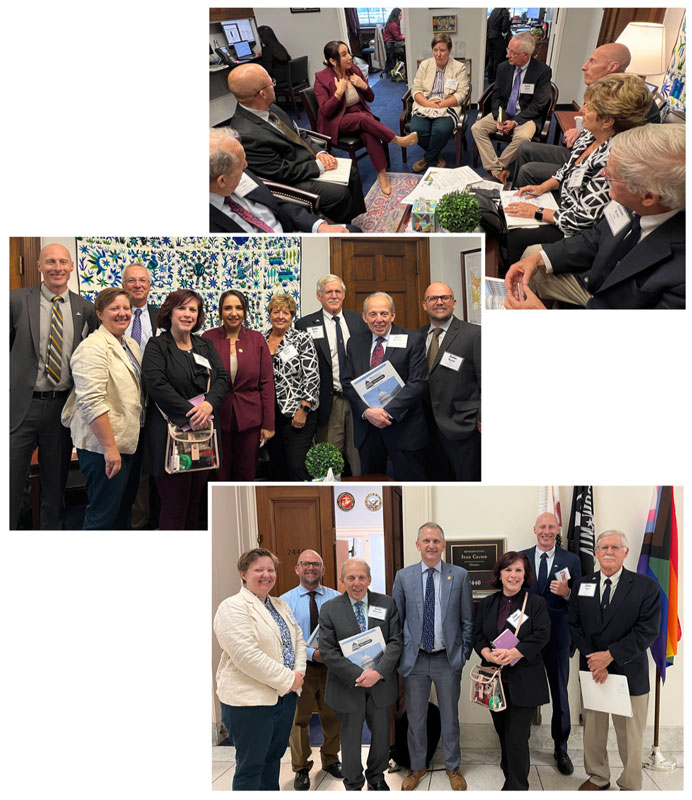10/31/2025
The Impact We Have on Washington
Jennifer Zurko

 By now, with this being my 10th time on Capitol Hill for a fly-in event, I’m an old pro at going into policymakers’ offices and covering the issues that affect our industry. But this was the first time that I was able to be a part of the press corps during a House congressional hearing.
By now, with this being my 10th time on Capitol Hill for a fly-in event, I’m an old pro at going into policymakers’ offices and covering the issues that affect our industry. But this was the first time that I was able to be a part of the press corps during a House congressional hearing.
The chamber of the House Agriculture Committee. Meant to be intimidating.
The panel testifying in front of the House Ag Committee. From left to right: Michael Frantz, Dr. Ramesh Sagili, Dr. Tim Boring and Dana Brennan.
In September, I attended AmericanHort’s biennial legislative fly-in event, Impact Washington, which was sold out for the first time, with 140 participants from 25 states and more than 220 meetings on Capitol Hill. As it turned out, AmericanHort was also invited to have a representative come and testify in front of the House Agriculture Committee to discuss specialty crops and some of the challenges growers have in this segment.
That representative was Michael Frantz, president of Frantz Wholesale Nursery in Hickman, California. Michael is no rookie, either—he’s very active in promoting his business to local and federal legislators, is a past chairman of AmericanHort’s Advocacy Committee, and is always in attendance at Impact Washington. I first met Michael about 10 years ago, so I knew he was an excellent choice to represent the floriculture and nursery sector.
“I thought it was a real honor to be able to speak on behalf of American nurseries and garden centers across the country. And I was quick to say yes,” said Michael. “And I think we got to give credit where credit is due and that’s to (AmericanHort VP of Advocacy & Government Affairs) Matt Mika and (AmericanHort President & CEO) Ken Fisher for having the relationship with Chairman Thompson to get the invitation.”
The three others in attendance who also testified were: Dana Brennan, VP of corporate affairs for Grimmway Farms, representing the International Fresh Product Association; Dr. Tim Boring, director of the Michigan Department of Agriculture & Rural Development, representing the National Association of State Departments of Agriculture; and Dr. Ramesh Sagili, professor of horticulture at Oregon State University.
The chairman of the House Ag Committee, Rep. GT Thompson (R-PA) started the hearing, acknowledging that specialty crops play a critical role in agriculture. “I support this essential sector,” he said. Ranking member Rep. Angie Craig (D-MN) agreed, saying, “I appreciate this bipartisan hearing.”Each of the speakers was able to read a four-minute opening statement. Michael spoke about his business and his experience in advocating for it.
Even though Frantz Wholesale Nursery grows more than 700 different varieties of trees and shrubs, he doesn’t qualify for some of the disaster relief available to big ag operations when something happens. He talked about the need for additional funding for specialty crop research, which should be part of the next Farm Bill, and that tariffs and the uncertainty around the constant changes have made it difficult to plan and afford inputs that his business has used for years, like peat moss and coconut coir for growing media. He thanked the committee for including peat moss in one of the ag exemptions, but that more needs to be added to that list.
Michael and the rest of the panel answered questions from the 50 different members of the Ag Committee for three-and-a-half hours. It was truly going through the gauntlet, as members and aides were coming and going in and out of the chambers the whole time. And because not all of the members are in the chambers at the same time, Michael and the other panelists had to answer similar questions multiple times. But he said that AmericanHort’s Rachel Pick and Kamron Newberry sat with him the day before to make sure he was fully prepared, going through multiple scenarios and coaching him on what to say (and what not to say).
“I went into it very nervous—the room is built to be intimidating and it is—but within an hour, my nerves calmed down,” he said.
I asked Michael how he felt about it afterwards, after navigating the intimidation factor and being, at times, in the middle of some not-so-subtle swipes from members when it was their turn to ask questions. And there was something that he expressed that’s been severely lacking in our recent body politic—hope and optimism.
“There’s definitely some partisan gamesmanship going on in the room, but, in general, I was heartened,” Michael explained. “The Ag Committee is traditionally always a bipartisan group. I felt good that I was able to deliver the key messages that I believe are important to our industry. Whether they choose to act on passing a Farm Bill, resolving our workforce issues, tariff relief, price stability, all these things that you heard me hammer over and over again, of course, is outside of my control. But I feel like that I’m so grateful that we had a seat at the table and that I was able to hopefully articulate from a first-person perspective how great the needs are.”
After the hearing, Michael and the rest of the California delegation had their regularly scheduled meetings on the Hill with their members’ offices. He was pleasantly surprised that all of the legislative aides knew that he testified in front of the Ag Committee and that they watched it. Also, Michael isn’t a stranger to these offices—again, he’s been playing at this game for over a decade. And that constant direct facetime does make a difference.
 “I understand how easy it is to get cynical. But I encourage [other growers] to get involved because I continue to believe we can make a difference,” said Michael. “At that hearing, it was amazing to me how attentive these very busy people were. It seemed to me that there was engagement there, there was interest there. Same thing on a couple of our one-on-one meetings. Every once in a while, you seem to connect at a human level and I think it matters.”
“I understand how easy it is to get cynical. But I encourage [other growers] to get involved because I continue to believe we can make a difference,” said Michael. “At that hearing, it was amazing to me how attentive these very busy people were. It seemed to me that there was engagement there, there was interest there. Same thing on a couple of our one-on-one meetings. Every once in a while, you seem to connect at a human level and I think it matters.”
Yes, any sort of advancement on policy can be very slow. Think of it like trying to chip away at a big mountain with an ice pick—with just one person, it would take forever. But if you had a bunch of people with ice picks chipping away at the same mountain, eventually you begin to see some noticeable progress.
Half of the Illinois delegation with Rep. Delia Ramirez. (There were so many of us from Illinois we had to split up.) Ball’s headquarters is in her district.
Us with Rep. Sean Casten.
“Getting these folks’ cell phone numbers, having the ability to interact with them, inviting them out to your nursery, contributing to AmericanHort’s PlantPAC or contributing directly to your congress member—even if it’s only a couple hundred dollars—getting on their radar as a funder of their campaign matters personally to them,” said Michael. “And I do believe that with consistent messaging you can make a difference.”
You can watch the recording of Michael’s testimony in front of the House Ag Committee HERE.
For our meetings on the Hill, I was REALLY proud of the representation from the Illinois delegation—we had 19 people knocking on our legislators’ doors and sitting down with their staff to discuss the most pressing issues affecting the specialty crop sector. The legislative agenda all of the attendees from Impact Washington presented to their representatives included:
- Workforce and labor: Alleviating the challenges of the H-2A visa program, including the rising demand, escalating costs and the Adverse Effect Wage Rate. Chairman of the Ag Committee GT Thompson (R-PA) and the bipartisan Agricultural Labor Working Group are currently working together to craft legislation that would address these issues.
- Specialty crop priorities to be included in the next Farm Bill: The last Farm Bill to pass was in 2018 and a lot has changed and needs to be added. Members expressed optimism that a new one will be passed by the end of the year.
- Tariff exemptions for key horticultural inputs, including on young plants/URC, plastic pots and containers, irrigation equipment and machinery.
- Increase funding for specialty crop research, including with IR-4.
What Michael Frantz said about engagement with your policymakers is absolutely true: the more you do it, the more you see the benefits. Ball’s West Chicago headquarters is in Congresswoman Delia Ramirez’s district. Although she’s only on her second term, she’s getting to know us and makes a point to meet with us directly whenever we come to her office, especially since a few of us in the delegation are also her constituents who not only work, but live in her district.
Congressman Sean Casten’s district moved further south after the re-districting in 2020, but he has visited Ball and he came out to greet us. We invited Rep. Ramirez to visit Ball, so we’ll be working with her scheduler to coordinate a time for her to come see us soon. GT
News, views, commentary and event coverage about the policies and legislation that directly affect our industry. Share your thoughts, opinions and news with me: jzurko@ballpublishing.com.